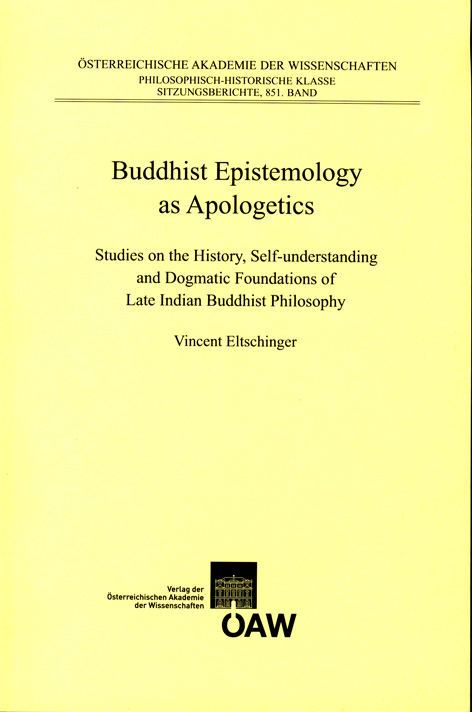
Buddhist Epistemology as Apologetics, pp. 93-190, 2014/05/12
Studies on the History, Self-understanding and Dogmatic Foundations of Late Indian Buddhist Philosophy
Dieses Buch beschäftigt sich zunächst mit den historischen und dogmatischen Grundlagen der Religionsphilosophie Dharmakīrtis. Es zielt auf den sozialgeschichtlichen Kontext brahmanischer Feindseligkeit gegenüber nicht- oder antivedischen Konfessionen (Kapitel 1), neue Muster buddhistischer Selbstdarstellung (Kapitel 2), neu erfundene Modelle theoretischer und apologetischer Rationalität (Kapitel 3) und die dogmatische Infrastruktur hinter der buddhistischen Epistemologie (Kapitel 4) ab. Die These lautet, dass buddhistischer „Tantrismus“ und buddhistische „Logik“ – zwei mehr oder weniger zeitgenössische Phänomene, die als die größten literarischen Ergebnisse der „frühmittelalterlichen“ Periode bezeichnet werden können – gemeinsame Merkmale aufweisen, die hinsichtlich polemischer Ziele und des Sichverstehens von Interesse sind. Seit dem Ende des fünften Jahrhunderts verloren intrabuddhistische Polemiken an Relevanz (zumindest in ihrer bis dahin herrschenden Form) und rückten zum Teil in den Hintergrund zugunsten inter- oder transkonfessioneller Debatten. Die Abkehr von Abhidharma und der Fokus auf neue, überwiegend nicht-buddhistische Ziele führte zu einem Verzicht auf scholastische, konfessionsspezifische Terminologien und Methoden sowie zu der Entwicklung neuer Modelle für theoretische und apologetische Rationalität: erstens, die Erstellung eines klaren Konzepts der Vernunft im Gegensatz zur autoritativen Schrift; zweitens, der allmähliche Aufbau eines Konzepts für praktische Rationalität im Dienste der apologetischen Absicht, ebenjene Möglichkeit oder Rationalität des buddhistischen Weges zu verteidigen. Letztlich wird geprüft, inwiefern buddhistische Epistemologie überhaupt als buddhistisch bezeichnet werden kann, zieht man ihre tiefere dogmatische Struktur in Betracht. Die Grundlagen buddhistischer Epistemologie – u. a. die apoha-Theorie und die pramāṇa-Lehre – werden als Rationalisierung und apologetisch aktualisierte Version buddhistischer Dogmen interpretiert, die sich auf die Struktur höchster und herkömmlicher Realitäten, auf die kognitiven Grundlagen von Fehler und Fehlerausschluss und auf cintāmayī prajñā („Einsicht durch Reflexion“) als erlösendes Mittel überwiegend inferentieller/induktiver Ordnung beziehen.
This book deals first with the historical and doctrinal foundations of Dharmakīrti’s religious philosophy. It points to a socio-historical context of Brahmanical hostility toward non- and anti-Vedic denominations (chapter 1), new patterns of Buddhist self-diction (chapter 2), reinvented models of theoretical and apologetical rationality (chapter 3), and the dogmatic infrastructure underlying Buddhist epistemology (chapter 4). It argues that Buddhist “Tantrism” and Buddhist “logic,” two roughly contemporary phenomena that can be regarded as the main literary outcomes of the “early medieval” period, share interesting features in terms of polemical targets and self-understanding. Since the end of the fifth century, intra-Buddhist polemics have become less relevant (at least in the form it had had heretofore) and partly receded into the background in favor of inter- or cross-confessional controversies. Departing from Abhidharma and addressing new, predominantly non-Buddhist targets resulted in the abandonment of scholastic, confession-specific terminology and meth¬ods as well as the development of new models of theoretical and apologetical rationality: first, the construction of a clear-cut concept of reason(ing) as opposed to scripture; second, the gradual constitution of a concept of practical rationality that served the apologetic purpose of defending the very possibility, or rationality, of the Buddhist path. Finally, the book examines the extent to which Buddhist epistemology can be said to be Buddhist at all as regards its deeper doctrinal structure. It attempts to interpret the foundations of Buddhist epistemology – the apoha theory, the doctrine of the pramāṇas, etc. – as a rationalization and an apologetically updated version of Buddhist dogmas on the structure of ultimate and conventional realities, on the cognitive bases of error and its elimination, and on the cintāmayī prajñā (“insight born of reflection”) as a salvific means of a predominantly inferential order.